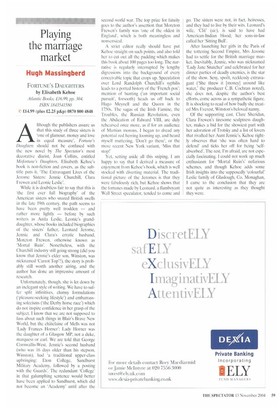Playing the marriage market
Hugh Massingberd
FORTUNE'S DAUGHTERS
by Elisabeth Kehoe Atlantic Books, £16.99, pp. 304, ISBN 1843541580 £14.99 (plus £2.25 p&p) 0870 800 4848
AIthough the publishers assure us that this study of three sisters is one of glamour, money and love in equal measure', Fortune's' Daughters should not be confused with the new novel by The Spectator's most decorative diarist, Joan Collins, entitled Misfotiune's Daughters. Elisabeth Kehoe's book is non-fiction and covers, as the subtitle puts it, `The Extravagant Lives of the Jerome Sisters: Jennie Churchill, Clara Frewen and Leonie Leslie'.
While it is doubtless fair to say that this is 'the first ever full biography' of the American sisters who snared British swells in the late 19th century, the path seems to have been pretty well trodden — and rather more lightly — before by such writers as Anita Leslie, Leonie's granddaughter, whose books included biographies of the sisters' father, Leonard Jerome, Jennie and Clara's erratic husband, Moreton Frewen, otherwise known as 'Mortal Ruin'. Nonetheless, with the Churchill industry still going strong (did you know that Jennie's elder son, Winston, was nicknamed `Carrot Top"?), the story is probably still worth another airing, and the author has done an impressive amount of research.
Unfortunately, though, she is let down by an inelegant style of writing. We have to suffer split infinitives, clumsy formulations (pleasure-seeking lifestyle') and embarrassing solecisms (the Derby horse race') which do not inspire confidence in her grasp of the subject. I know that we arc not supposed to fuss about such things in Blair's Brave New World, but the chatelaine of Mells was not 'Lady Frances Homer': Lady Homer was the daughter of a Glasgow MP, not a duke, marquess or earl. We are told that George Cornwallis-West, Jennie's second husband (who was 16 days older than his stepson, Winston), had 'a traditional upper-class upbringing: Eton College, Sandhurst Military Academy, followed by a posting with the Guards'. The redundant 'College' in that galumphing sentence would better have been applied to Sandhurst, which did not become an 'Academy' until after the second world war. The top prize for fatuity goes to the author's assertion that Moreton Frewen's family was 'one of the oldest in England', which is both meaningless and nonsensical.
A strict editor really should have put Kehoe straight on such points, and also told her to cut out all the padding which makes this book about 100 pages too long. The narrative is regularly interrupted by lengthy digressions into the background of every conceivable topic that crops up. Speculation over Lord Randolph Churchill's syphilis leads to a potted history of the 'French pox'; mention of hunting Can important social pursuit', forsooth) heads us off hack to Hugo Meynell and the Quorn in the 1750s. The sagas of the Irish Famine, the Troubles, the Russian Revolution, even the Abdication of Edward VIII, are duly rehearsed once more, as if for an audience of Martian morons. I began to dread any potential red herring looming up, and heard myself muttering, 'Don't go there', or the more recent New York variant, 'Miss that stop?'
Yet, setting aside all this sniping, I am happy to say that I derived a measure of enjoyment from Kehoe's hook, which is well stocked with diverting material. The traditional picture of the Jeromes is that they were fabulously rich, but Kehoe shows that the fortunes made by Leonard, a flamboyant Wall Street speculator, tended to come and
go. The sisters were not, in fact, heiresses, and they had to live by their wits. I zonard's wife, 'OW (sic), is said to have had American-Indian blood; her sons-in-law called her 'Sitting Bull'.
After launching her girls in the Paris of the tottering -Second Empire, Mrs Jerome had to settle for the British marriage market. Inevitably, Jennie, who was nicknamed 'Lady Jane Snatcher' and celebrated for her dinner parties of deadly enemies, is the star of the show. Sexy, spoilt, recklessly extravagant (She threw it [money] around like water,' the producer C.B. Cochran noted), she does not, despite the author's best efforts, come across as a sympathetic figure. It is shocking to read of how badly she treated Mrs Everest, Winston's beloved nanny.
Of the supporting cast, Clare Sheridan, Clara Frewen's tiresome sculptress daughter, makes a bid for the showiest part with her adoration of Trotsky and a list of lovers that rivalled her Aunt Jennie's. Kehoe rightly observes that 'she was often hard to defend' and ticks her off for being 'selfabsorbed'. The rest, I'm afraid, are not especially fascinating. I could not work up much enthusiasm for 'Mortal Ruin's' nefarious schemes, and though Kehoe adds some Irish insights into the supposedly 'colourful' Leslie family of Glaslough, Co. Monaghan, I came to the conclusion that they are not quite as interesting as they thought they were.


























































































 Previous page
Previous page